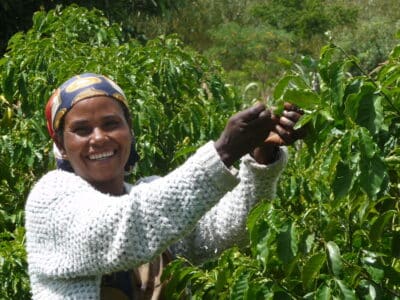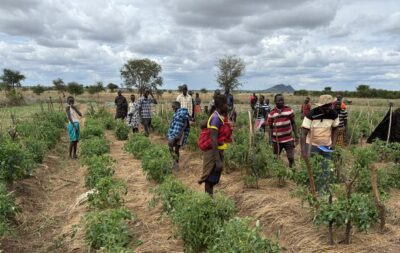News
18 December 2017
Does farming need a rebrand to encourage more young people into agriculture?

Farmers are ageing: the average age of a farmer in many parts of the world is around 60, and rising. So where have all the young farmers gone and who is going to farm our food in the future? That’s what BBC World Service’s The Food Chain programme set out to discover.
The Food Chain’s Emily Thomas interviewed Farm Africa’s Mary Nyale for both episodes, I Won’t Farm (07 December 2017) and How to Make a Farmer (14 December 2017).
The first episode focused on why so many young people are turning away from farming. The programme covered a number of countries including Kenya, where the average age of a farmer is 63, a year higher than life expectancy there.
With 22% of Kenyan young people out of work, the country has the highest level of youth unemployment in eastern Africa. As the nation’s biggest employer, agriculture is the obvious choice for the next generation. Yet many young Kenyans are turning their backs on farming, leaving their parents to run the farm while they seek alternative employment.
The Food Chain caught up with Rivian Nyanduko Bundi, a 17-year-old from western Kenya whose parents are farmers. Like many of her contemporaries, Rivian has no ambition to follow in her parents’ footsteps.
Rivian thinks agriculture in Kenya is being held back by two intertwined problems: a poor image and lack of profitability. “I hate farming because the crops sometimes fail to grow very well, meaning you don’t earn very much money at all,” she explained
Alongside the financial problems many farmers face, Rivian gave the impression that she didn’t think agriculture represented an interesting career choice. “Nothing can change my mind about farming,” concluded the teenager.
Mary Nyale, the coordinator of Farm Africa’s Growing Futures project in western Kenya, knows all too well about the low regard many young people hold farming in. She told Emily:
“It’s not cool, it’s not trending. Young people look at it as a dirty job, a last resort. The problem is that people don’t understand the business behind the farming.”
Mary explained that the key to encouraging young people back into farming is to demonstrate that it can be a lucrative career. Across Kenya, agricultural profits and yields are way below their potential. But initiatives such as the Growing Futures project, which helps young people build profitable horticulture enterprises, demonstrate that taking a business approach to farming make it possible to earn a decent, consistent income from farming.
Mary’s interview highlights that an investment in equipping young people with the knowledge, skills and resources to treat agriculture as a business can trigger a significant change in attitudes; the few-and-far-between white collar jobs begin to lose their appeal and farm jobs go from being an occupation to vocation.
Young people’s disenchantment with farming is due to a complex blend of social, cultural and economic factors. It’s in all of our interests to turn the tide and encourage the next generation into agriculture.
Farm Africa plans to scale up the Growing Futures project to reach more young farmers living in poverty in western Kenya. All donations from UK residents to Farm Africa’s Growing Futures appeal will be doubled by the UK Government until 14 January 2018.





